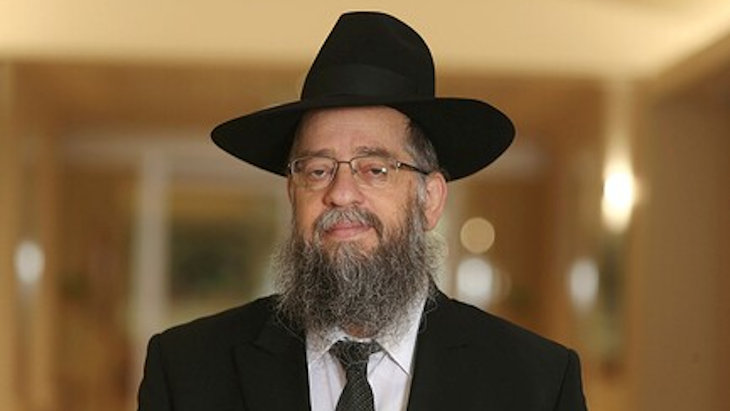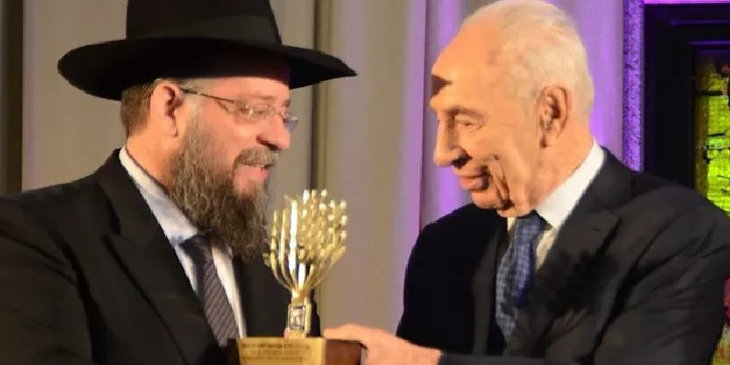 Vampire Weekend's Surprising Jewish Stories
Vampire Weekend's Surprising Jewish Stories


5 min read
Rabbi Heber helped facilitate over 800 kidney transplants in Israel and around the world.
In 2006, Rabbi Avraham Yeshayahu Heber was an incredibly busy 42-year-old father and husband living in Jerusalem. He was working two jobs, as a school principal and a teacher, and had the energy for a full, bustling life.
Then he became gravely ill with kidney disease. Within months, Rabbi Heber’s life narrowed to a series of doctors’ appointments and painful medical treatments. His doctors told him that without a kidney transplant, his prospects were poor. Rabbi Heber was entered onto the list of patients waiting for kidney transplants in Israel. As in other countries, that list is tragically long and patients can wait for years to find a suitable donor.
Each week, Rabbi Heber had to travel to Jerusalem’s Shaare Zedek Medical Center for dialysis to clean his blood, a function that his kidneys could no longer perform. Dialysis took four hours a day, three times a week. The process is exhausting, weakening patients’ immune systems and often resulting in patients feeling mentally and physically exhausted. Rabbi Heber was told that he could potentially gain an extra five to seven years of life through this grueling dialysis regime, but that the only cure for his kidney disease would be a kidney transplant.
During these long and grueling dialysis sessions, one thing brightened Rabbi Heber’s days. He became friends with a younger dialysis patient named Pinchas Turgeman. Just 18, Pinchas also was on the kidney transplant list. The two men became study partners and spent hours each week reading and discussing the Talmud. Sharing a love of studying Torah and the experience of life with irreparable kidney disease, they became very close.
Luckily, Rabbi Heber was soon told that a donor had been found for him and he was able to have the lifesaving kidney transplant he needed. Overjoyed, he told his friend. Pinchas was happy for Rabbi Heber but couldn’t resist asking, “What about me?” Both men knew that Pinchas’ kidney disease was already very advanced and he was running out of time.
Rabbi Heber’s transplant was successful and he soon regained his health enough to help search for a donor for Pinchas. Unlike many organs, kidneys can be donated by a living donor. People are born with two kidneys and even if they donate one, the other provides enough vital blood filtering activity to maintain a person’s health. Years later, in encouraging others to consider kidney donation, Rabbi Heber would explain this concept, concluding: “So with one kidney you can live ad meah v’esrim (until the ripe old age of 120) totally healthy.”
Eventually, Rabbi Heber did find a kidney donor for Pinchas, but by then it was too late: Pinchas Turgeman passed away from kidney disease at the age of 22, two weeks before his scheduled transplant.
 Rabbi Heber with Shimon Peres
Rabbi Heber with Shimon Peres
Pinchas’ death devastated Rabbi Heber. After his friend’s funeral he sat by himself alone, not eating nor sleeping, just wondering what he could do so that he never again would have to go to the funeral of a person whose life could have been saved by a kidney donation. The day after Pinchas’ funeral, Rabbi Heber decided that his life’s goal was to help facilitate live kidney donations, raising awareness of the procedure and helping test and facilitate donor matches.
In 2009 Rabbi Heber founded Matnat Chaim. Its name means The Gift of Life in Hebrew. “We...have first-hand knowledge of the suffering undergone by kidney patients in need of kidney transplant” Matnat Chaim’s mission statement declares; “(we) feel that it is our duty to ease the difficulties they encounter in finding living kidney donors. We have therefore formed a voluntary association with the aim of encouraging living kidney donations in Israel.”
Matnat Chaim spread awareness of kidney donation and raised the issue in Israel’s press. It also helped people register to be tested to be potential donors. Instead of waiting until a patient with kidney disease was gravely ill, Rabbi Heber helped pioneer a novel approach: healthy Israelis would be encouraged to test and see if they could donate kidneys, even to people they did not personally know. With so many patients waiting on the transplant list, every person who is willing to be tested can potentially save a life. In fact, about 80% of kidney donations in Israel today take place between strangers, in part due to Rabbi Heber’s efforts at education and signing up donors.
In the first year Matnat Chaim was operating, Rabbi Heber and Matnat Chaim located four kidney donors. During the second year, they helped make arrangements for eight donations. By 2019, Matnat Chaim had arranged over 800 kidney transplants. In recent years the organization had expanded beyond its base in Israel, arranging at least one kidney donation in England, as well.
In recent weeks Rabbi Heber became ill with Covid-19. He passed away on Thursday, April 23, in Jerusalem, at the age of 55.
His legacy is one of life for hundreds of kidney patients who today enjoy healthy lives, and also of incredible generosity and kindness as he encouraged hundreds of people to perform the mitzvah of pikuach nefesh, or saving a life, by donating kidneys. Israeli Prime Minister Binyamin Netanyahu “expressed his deep sorrow about the passing” of Rabbi Heber, noting that Rabbi Heber “instilled the awareness of the importance of donations in the general public… Thanks to him, hundreds of people in Israel were granted a new life.”
Benny Gantz, the leader of the Blue and White party in Israel noted that Rabbi Heber “spread so much kindness and solidarity… The parents, children, brothers and sisters that owe him the lives of their loved ones, and all of us, who were impacted by the power of his giving to the community are grieving tonight.”
